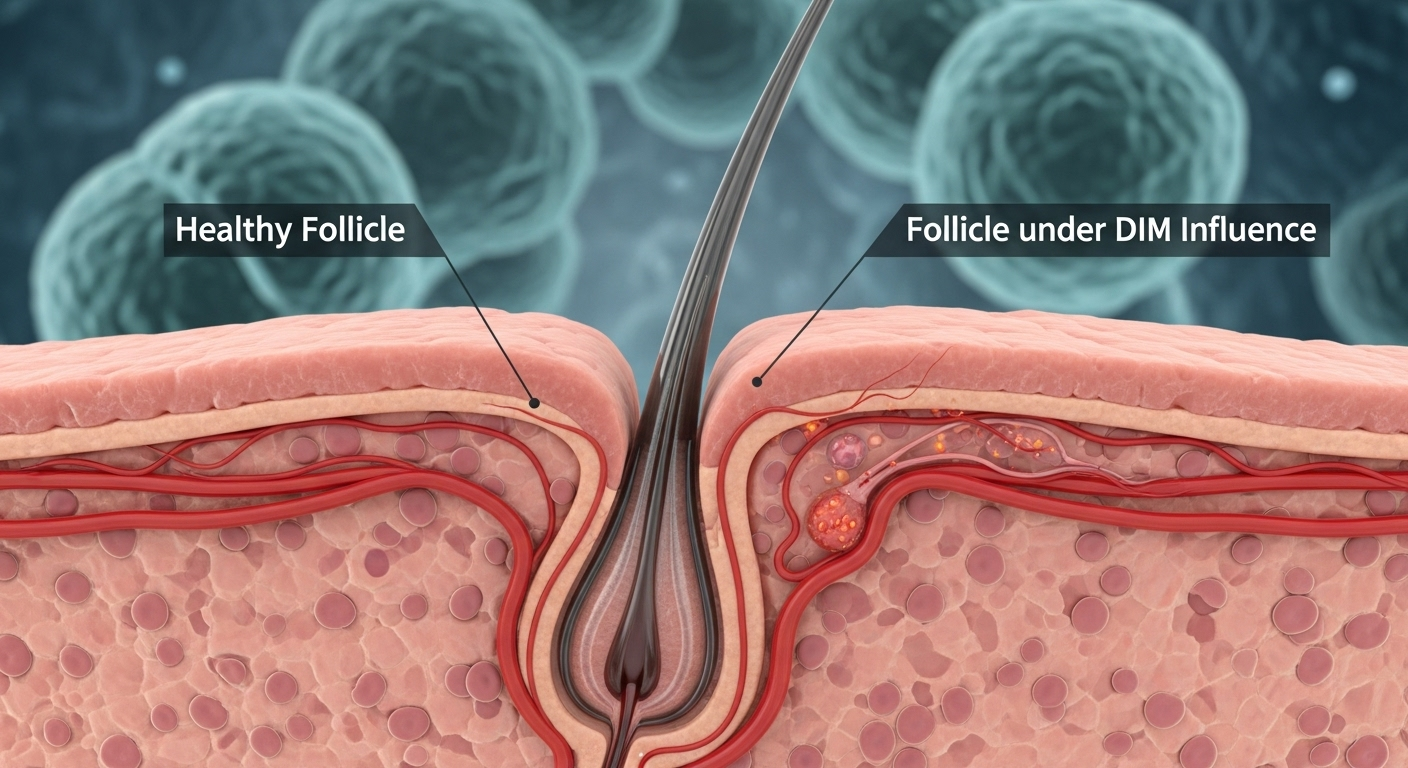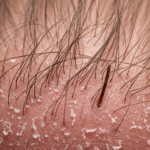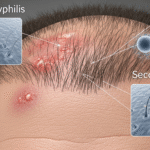If you're considering taking DIM (diindolylmethane) supplements for hormone balance, you might wonder: Can DIM cause hair loss? While DIM is often celebrated for its potential benefits in balancing estrogen levels, some individuals report experiencing hair thinning or shedding upon starting supplementation. This article delves into the relationship between DIM and hair health, exploring both …
If you’re considering taking DIM (diindolylmethane) supplements for hormone balance, you might wonder: Can DIM cause hair loss? While DIM is often celebrated for its potential benefits in balancing estrogen levels, some individuals report experiencing hair thinning or shedding upon starting supplementation.
This article delves into the relationship between DIM and hair health, exploring both anecdotal reports and scientific perspectives to provide a comprehensive understanding. You will also learn effective ways to address and prevent any potential hair loss associated with DIM.
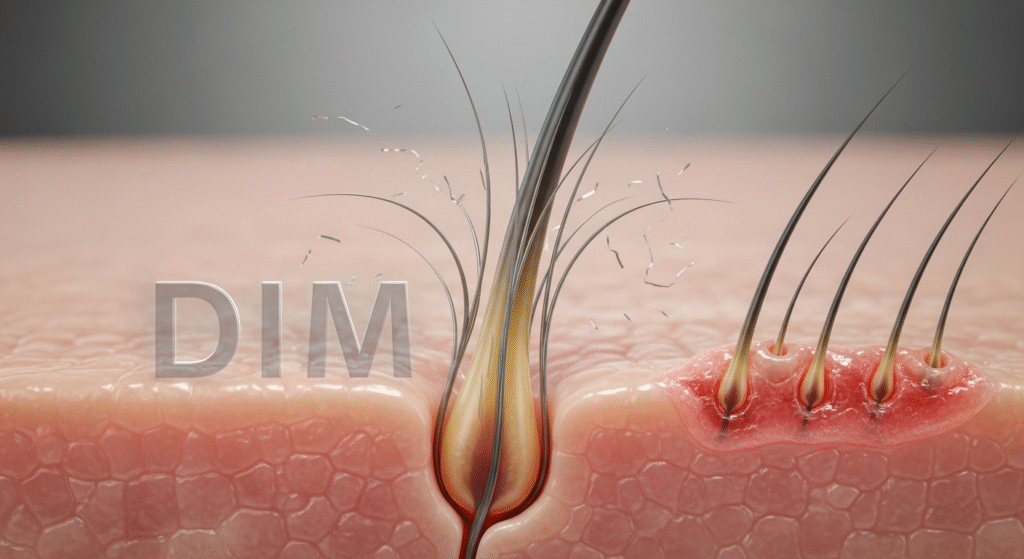
What Is DIM and Its Role in the Body?
Understanding DIM
Diindolylmethane (DIM) is a compound derived from the digestion of indole-3-carbinol, a substance found in cruciferous vegetables such as broccoli, Brussels sprouts, and cabbage. It is commonly used as a supplement for its potential to promote estrogen metabolism and support hormone balance.
When consumed, DIM aids in the conversion of estrogen into beneficial metabolites, potentially reducing the effects of excess estrogen and promoting overall hormonal health.
DIM is widely recognized for its anti-estrogenic properties, which is why it’s often recommended for individuals dealing with hormonal imbalances, such as those related to menopause, PCOS (polycystic ovary syndrome), and even breast cancer prevention.
While the benefits of DIM are well-known, the supplement can have varying effects on different individuals, leading some to question if DIM can cause hair loss.
How DIM Works in the Body
DIM works by promoting the breakdown of estrogen in the body into metabolites that are either healthy or problematic. By increasing the ratio of healthy estrogen metabolites, DIM can help regulate hormonal imbalance and reduce symptoms like mood swings, weight gain, and hair loss. However, this process can lead to an unintended consequence for some—hair thinning or hair shedding.
How DIM Might Influence Hair Health
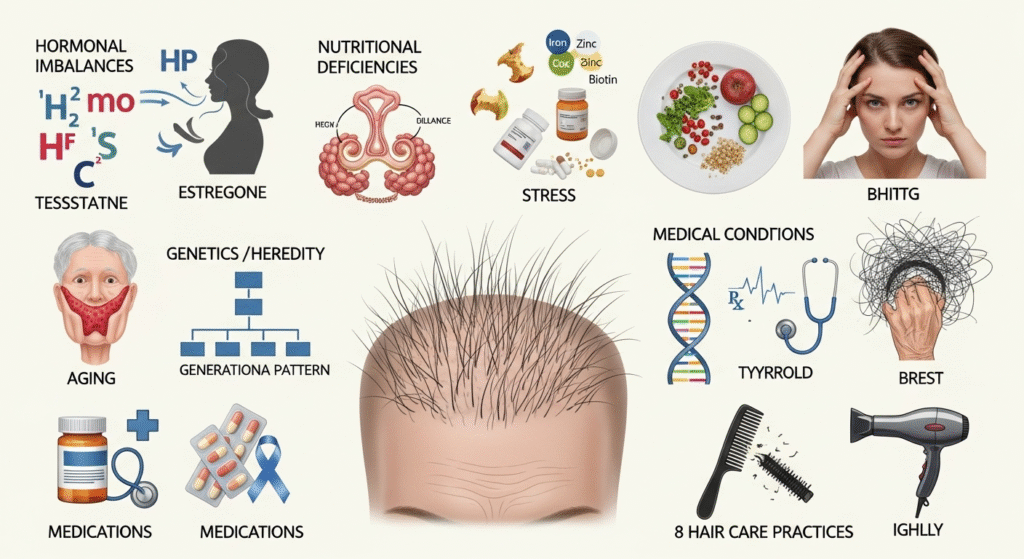
Potential Mechanisms of Hair Loss
Although DIM is commonly used to support hormone balance, its effects on hair health are not entirely straightforward. Several potential mechanisms could explain why some individuals experience hair thinning or shedding upon beginning DIM supplementation:
1. Hormonal Fluctuations
DIM’s primary function is its role in estrogen metabolism. While it promotes healthy estrogen balance, the alteration of hormone levels, especially the balance between estrogen and testosterone, may have unintended effects.
Testosterone, when converted into dihydrotestosterone (DHT), is a potent androgen hormone known to cause hair loss, particularly in individuals predisposed to androgenic alopecia (pattern baldness).
- DHT can bind to hair follicles, causing them to shrink and eventually leading to hair thinning and loss.
- DIM’s estrogen-regulating properties might inadvertently increase the activity of testosterone or DHT in some individuals, triggering hair loss.
2. Detoxification Effects
DIM supports liver detoxification, which is crucial for hormone regulation. However, detoxing can cause the release of toxins that have been stored in fat cells, including those that may impact the hair follicle.
For individuals with poor overall health or underlying conditions, the sudden release of toxins may contribute to hair shedding.
- As the body flushes out toxins, hair follicles may temporarily enter the resting phase of the hair growth cycle, leading to increased shedding.
3. Estrogen Imbalance
While DIM works to balance estrogen levels, it can sometimes result in an overcorrection or excessive reduction in estrogen. For women, estrogen plays a critical role in maintaining hair growth and follicle health. Low estrogen levels can result in thinning hair, particularly in postmenopausal women.
- Estrogen deficiency can lead to a shorter anagen (growth) phase of the hair cycle and a prolonged telogen (resting) phase, resulting in noticeable hair thinning.
Anecdotal Evidence and User Experiences
User experiences vary when it comes to DIM supplementation and hair loss. While many individuals report improved skin, mood, and hormonal balance, some have noted hair thinning and shedding after starting DIM.
- One user shared on a popular health forum that they experienced increased hair shedding upon using DIM, but this was alleviated after lowering the dosage (reddit.com).
- Another person reported that while DIM helped balance their hormones, they noticed thinning hair after three months of supplementation.
These anecdotal reports suggest that while DIM can support hormonal balance, it may not be suitable for everyone, especially those with a predisposition to hormone-related hair loss.
Scientific Perspective on DIM and Hair Loss
Limited Research on DIM’s Impact on Hair
Scientific studies that directly examine the effects of DIM on hair loss are limited. Most research focuses on its hormonal benefits rather than its impact on hair follicles. A review by The National Institutes of Health (NIH) on the effects of DIM suggests it plays a crucial role in regulating estrogen metabolism but does not provide sufficient evidence to conclude that it directly causes hair loss.
While DIM has shown promise in treating hormone-related issues like endometriosis, there is no definitive scientific consensus on its relationship with hair health. Experts agree that the effects of DIM can vary depending on individual health conditions and responses to the supplement.
Factors That May Contribute to Hair Thinning
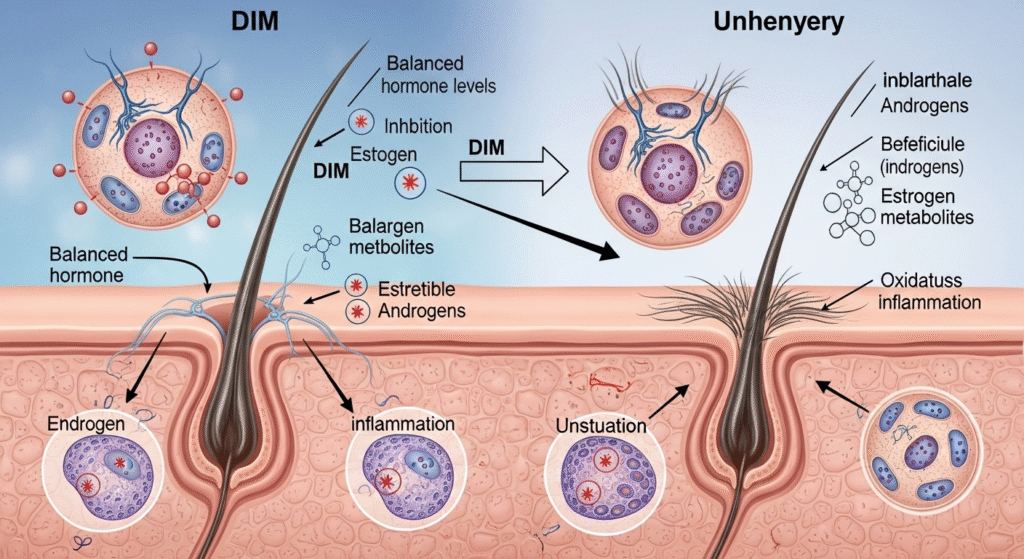
If you’re experiencing hair thinning, it’s important to consider other factors that might be contributing to the issue:
1. Hormonal Imbalances
Conditions like PCOS, menopause, and pregnancy can all affect hormone levels and lead to hair thinning. Even when taking supplements like DIM, underlying hormonal imbalances may still contribute to hair issues.
2. Nutritional Deficiencies
A deficiency in vitamins and minerals like iron, zinc, and biotin can weaken hair follicles and result in hair shedding. A balanced diet rich in essential nutrients is crucial for maintaining healthy hair.
3. Stress and Anxiety
Physical and emotional stress can trigger telogen effluvium, a condition where hair prematurely enters the shedding phase. Managing stress through mindfulness, exercise, and relaxation techniques can help prevent or minimize hair loss.
4. Medications
Certain medications, including those for hormone-related conditions, can have side effects that impact hair health. Always check with a healthcare provider before starting any new supplement or medication.
Recommendations for Those Concerned About Hair Loss
If you’re taking DIM and notice hair thinning, consider the following steps to help mitigate the effects:
1. Consult a Healthcare Provider
Before making any changes to your supplement regimen, it’s crucial to speak with a healthcare provider. They can help determine whether DIM is the cause of your hair thinning and provide alternative options if needed.
2. Monitor Dosage
Reducing the dosage of DIM may alleviate hair thinning for some individuals. It’s essential to follow the recommended dosage and consult a professional if you experience side effects.
3. Evaluate Other Contributing Factors
Hair thinning may be caused by other underlying health issues, such as stress, nutritional deficiencies, or hormonal imbalances. Addressing these factors alongside DIM supplementation can improve hair health.
4. Consider Alternative Supplements
If DIM continues to cause hair issues, you might want to explore other supplements known to support hormonal health without affecting hair follicles.
FAQs
1. Can DIM cause hair loss?
While DIM (diindolylmethane) supplementation can help balance estrogen levels, some individuals may experience hair thinning or shedding as a side effect. This could be due to hormonal fluctuations, detoxification effects, or imbalances in estrogen and testosterone levels. However, scientific evidence on DIM and hair loss is still limited, and the effects can vary from person to person.
2. How does DIM affect hair health?
DIM influences hair health primarily by regulating estrogen metabolism. By promoting the production of healthier estrogen metabolites, DIM can help balance hormones and reduce hair loss. However, in some individuals, DIM may increase testosterone or DHT levels, both of which are linked to hair thinning and loss, especially in those predisposed to androgenic alopecia.
3. Can hair loss from DIM be reversed?
DIM is generally considered safe for most individuals when taken at the recommended dosage. However, if you have hormone-related issues such as PCOS, menopause, or androgenic alopecia, it’s important to consult with a healthcare provider before starting DIM supplementation. If hair loss or other side effects occur, speak with your doctor to determine the best course of action.
4. Is DIM safe for everyone?
DIM is generally considered safe for most individuals when taken at the recommended dosage. However, if you have hormone-related issues such as PCOS, menopause, or androgenic alopecia, it’s important to consult with a healthcare provider before starting DIM supplementation. If hair loss or other side effects occur, speak with your doctor to determine the best course of action.
Conclusion
While some individuals report hair thinning after starting DIM supplementation, there is no conclusive scientific evidence linking DIM directly to hair loss. The effects of DIM on hair health can vary based on individual health conditions, hormone levels, and genetics. If you’re concerned about hair thinning while using DIM, it’s essential to consult with a healthcare provider who can offer personalized guidance and suggest alternative treatments if necessary.
By monitoring your body’s response to DIM and addressing any underlying health factors, you can take steps toward maintaining both hormonal balance and healthy hair growth.
Considering DIM for Hormonal Balance?
If you’re experiencing hair thinning or other side effects from DIM supplementation, it’s essential to consult with a healthcare provider. Schedule a consultation with Dr. Uzma Irfan, an ISHRS-certified surgeon in Islamabad today,determine the best course of action and explore alternatives that support both your health and hair growth.

